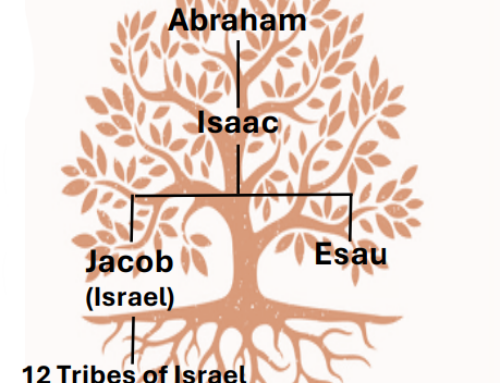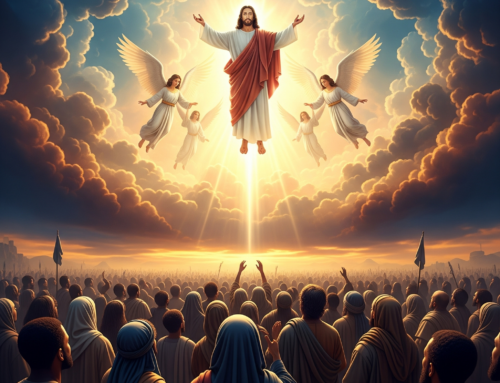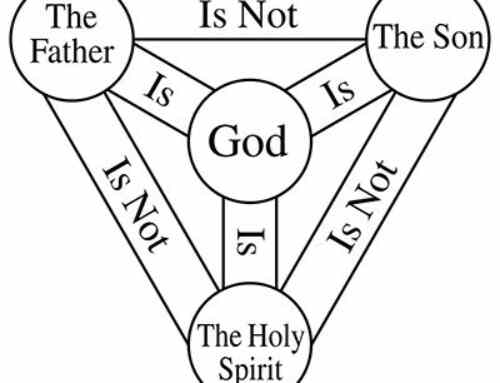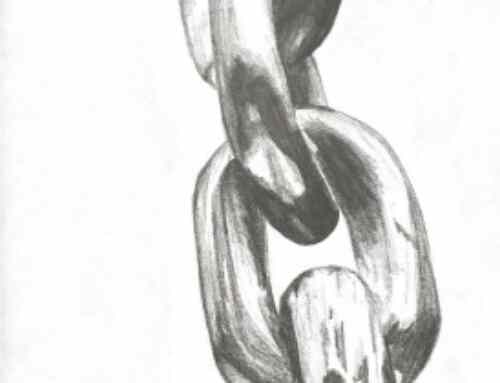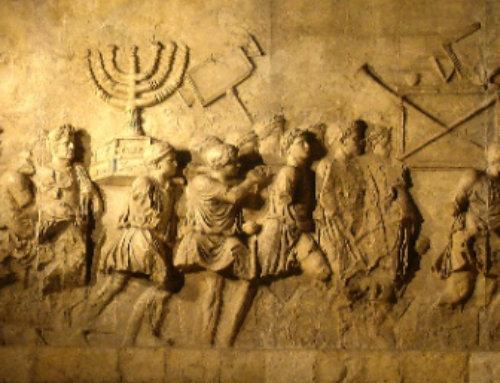Goal of this Study: WHAT does it mean to be “saved”? WHO saves us? WHAT are we saved from?
Is this the only time for salvation? WHAT is required for salvation?
Additional references: Studies in the Scriptures Vol. 1, Chap. 16
Why do we need to be saved?
- Genesis 2:16–17 “The LORD God commanded the man saying, ‘From any tree of the garden you may
eat freely; but from the tree of the knowledge of good and evil you shall not eat for in the day that
you eat from it you will surely die.’”

Adam and Eve, the first man and woman, were given a commandment by God not to eat the fruit of a certain tree. Despite knowing the penalty for doing so, Adam ate fruit from the tree. Genesis 3:6 Under God’s justice, Adam and his descendants were subject to death.
- Genesis 3:17–19 records God delivering the sentence to Adam.
- Disobedience to God is the definition of sin.
- Psalm 51:5 “Behold I was brought forth in iniquityand in sin my mother conceived me.”
This scripture reinforces the teaching that Adam and Eve’s descendants are under the death sentence because of Adam’s disobedience. The “iniquity” and “sin” in this verse refer to this death sentence. Each generation on their own, is powerless to break free from the sentence.
- Although by today’s standards and from a narrow viewpoint, the concept of judging people based on what their preceding generation did may seem harsh or even unfair, we still must have faith in God’s justice.
- We must remember God was very clear to Adam, who represented mankind, about the
penalty for disobedience. - We must remember we are God’s creation (Genesis 1:27), and God is justified in doing
whatever He sees fit with His creation. - We must be careful not to put ourselves in a position of judging God. Isaiah 55:8–9
- We must remember that God’s love for mankind has provided a path to be saved from this penalty.
- We must remember God was very clear to Adam, who represented mankind, about the
- Romans 6:23 “For the wages of sin is death, but the free gift of God is eternal life in Christ Jesus our Lord”
- This scripture plainly summarizes the fact that God cannot tolerate sin.
- Even though mankind justly deserves its death penalty, God’s love for mankind has provided
a path to be saved from it. - Salvation isn’t something any of mankind could earn on its own. Nothing any of us could do
makes us worthy of it. It is free from God, meaning that we couldn’t possibly pay Him for it.
What makes it possible for us to be saved?
Jesus provides mankind with the only pathway to salvation from the penalty of death.
Although we can’t perfectly understand God’s justice, the Bible teaches us to think of mankind’s penalty and salvation as a simple balancing scale. Just like Adam’s disobedience caused the death sentence to be on all of mankind—even if they weren’t the ones to directly disobey God’s commandment to not eat from the tree. Jesus’ sacrifice equally provides salvation from the death sentence to all of mankind – even though they weren’t the ones able to sacrifice their perfect lives in “payment” for the sin, because all mankind are born imperfect.
- 1 Corinthians 15:22 “For as in Adam all die so also in Christ all will be made alive.”
Jesus himself taught that he was the only means to approach God, and thus obtain salvation
- John 14:6 “Jesus said to him, I am the way, and the truth, and the life; no one comes to the Father
except through me.”
God had always planned for mankind’s salvation. Jesus’ role of providing salvation from mankind’s
sin of disobedience was declared even before his birth.
- Matthew 1:21 “She will give birth to a son; and you shall name him Jesus, for he will save his
people from their sins.” (See also 1 Peter 1:18–21)
Even though Jesus’ sacrifice provides mankind with salvation from the original death sentence due to Adam’s disobedience, it doesn’t change the fact that God still cannot, and never will condone sin. To maintain salvation from death, each person has, or will have, a personal responsibility towards remaining obedient to God.
What are the TWO salvations spoken of in the Bible?
1. The future earthly salvation
In the future, after man has been fully educated to understand the consequences of sin, each individual will need to make a choice. Each will need to either fully devote their lives to obeying God or again experience the consequences of sin—death. Acts 3:23
- Isaiah 35:8–10 “A highway will be there, a roadway, and it will be called the Highway of Holiness. The unclean will not travel on it, but it will be for him who walks that way, and fools will not wander
- on it. No lion will be there, nor will any vicious animal go up on it; they will not be found there.
- But the redeemed will walk there. And the ransomed of the LORD will return and come to Zion
with joyful shouting, and everlasting joy will be on their heads. They will obtain gladness and joy,
and sorrow and sighing will flee away.”
2. The present heavenly salvation
There is also an opportunity to make a fully devoted, unreserved consecration of one’s life to God now,
before the rest of mankind. This is a much harder path, as the majority of mankind doesn’t understand consecration. Present-day life offers many things to focus on other than God.
- Romans 12:1 “Therefore I urge you, brethren, by the mercies of God, to present your bodies
a living and holy sacrifice, acceptable to God, which is your spiritual service of worship.”

The Apostle Paul describes a “full” consecration as presenting one’s living body
as a sacrifice to God. Sacrifice means willingly giving up something of great value. Sacrificing one’s “living body” means we willingly give and devote the rest of
our lives to the main purpose of serving and worshipping God.
An “unreserved” consecration means there is no exception to what we choose
to leave behind in service to God. There is no, “I’ll go to church on Sundays and
do what I want the rest of the week.” The central point of life becomes our
service to God. Paul declares that his consecration is the primary focus of
his life. He goes as far as forgetting all of the pursuits of life he had before
and reaching forward to the future; a future which has him progressing each
day toward having a heart and mind acceptable to God.
- Philippians 3:13–14 “Brethren I do not regard myself as having laid hold of it yet; but one thing I do:
forgetting what lies behind and reaching forward to what lies ahead. I press on toward the goal for
the prize of the upward call of God in Christ Jesus.”
Paul also compares all of the priorities and pursuits we have to leave behind as weights holding us back.
Imagine trying to run a race while carrying a heavy rock. Then imagine laying the rock down and continuing
to run. Holding onto the priorities of the world will weigh down a consecrated life and make it difficult to
progress. Some worldly pursuits and preferences are harder to leave behind than others and are more likely
to slow down consecrated progress. Paul describes these as “the sin which so easily entangles us.”
- Hebrews 12:1 “…let us also lay aside every encumbrance and the sin which so easily entangles us,
and let us run with endurance the race that is set before us.”
“We urge such, while they lift up their heads and rejoice, knowing that their redemption draweth nigh, to lay aside every weight and hindrance, and to run patiently the race in which they have started. Look away from self and its unavoidable weaknesses and imperfections, knowing that all such weaknesses are covered fully by the merits of the ransom given by Christ Jesus our Lord, and that your sacrifices and self-denials are acceptable to God through our Redeemer and Lord—and thus only.” Vol. 1, p.346
How do the goals and joys of a consecrated life compare to the goals and joys of a worldly life?
- Philippians 4:7 “And the peace of God, which surpasses all comprehension, will guard your hearts
and your minds in Christ Jesus.” - The rewards of an earthly life are largely unfulfilling. The rich and powerful are often consumed
with either holding on to what they have or becoming even more rich and even more powerful.
They are rarely, if ever, at peace and satisfied at heart. - Consecrated people understand that the sacrifices they make will ultimately benefit all of mankind.
They also understand that as long as they are doing all they can to fulfil their vows, God will accept them. Having this knowledge brings a priceless peace beyond anything the world can offer or understand.
Brother Russell describes the joys of a consecrated life, emphasizing that even sadness and difficulties will
work out to eventual peace and joyfulness. No pursuit that the world has to offer can make this same promise:
“It is when hope has laid firm hold upon the exceeding great and precious promises of God’s Word, that joys spring up as flowers in a desert, vivified by our tears—such flowers of joy and blessing as the poor world in its wilderness condition could not produce or imagine. And as our joys depend upon our hopes they depend also upon our activities. It is not sufficient that
a promise has been left us, and that our hope has grasped the promise. By divine arrangement the joy which springs into being through the implanted hopes and prospects must be nourished by prayer, and by activity in the Lord’s service.” Vol. 6, pp. 678–679
Over time, dedicated consecration will change a person’s character to further reflect the perfect example of Jesus. Characteristics such as honesty, caring, sympathy and love will grow over time, and selfish and sinful tendencies will grow less and less.
“If you give diligence to the Word of God, and receive its truths into a good, honest, consecrated heart, it will beget in you such a love for God and his plan, and such a desire to tell the good tidings, to preach the gospel, that it will become the all-absorbing theme of life thereafter; and this will not only separate you from the world and from many nominal Christians, in spirit, but it will lead to separation from such entirely.” Vol. 1, p.347
Is there an ultimate reward for being faithful to the vows of living a consecrated life?
While it’s true that living a consecrated life now is more difficult than it will be for mankind in the future, the reward for successfully keeping one’s consecration vows now is much higher than our current minds can understand.
God is a divine being. Although we don’t fully understand what that means, we do know God cannot die. He is immortal. We know God understands the secrets of creation and the inner workings of the entire universe. We also know that after Jesus proved his obedience to God by successfully fulfilling his own consecration vows, he was also elevated to the divine nature, not dependent on any outside source for life. The reward for those who successfully keep their consecration vows is an existence with Jesus as divine beings.
- 1 John 3:2 “Beloved, now we are children of God, and it has not appeared as yet what we will be.
We know that when he appears, we will be like him because we will see him just as he is.”
The “children of God” are those who are now living their lives in full consecration.
These will be “like” Jesus; meaning, elevated to the divine nature as he was.
- 2 Peter 1:4 “For by these He has granted to us His precious and magnificent promises, so that by them
you may become partakers of the divine nature, having escaped the corruption that is in the world by lust.”
The “corruption that is in the world” is all the worldly pursuits that are abandoned and forgotten
during the development of a consecrated heart and mind. This scripture assures these will be granted
the divine nature.
- Revelation 20:6 “Blessed and holy is the one who has a part in the first resurrection; over these the
second death has no power, but they will be priests of God and of Christ and will reign with him for
a thousand years.”
The “first resurrection” is the resurrection of those who consecrate their present lives to God. They will be resurrected to their divine reward before the general resurrection of the rest of mankind. Like God and Jesus, their divine nature will make death impossible for them forevermore. After their resurrection, they will reign with Jesus during the Kingdom, helping to bring the rest of mankind into full, consecrated harmony with God over the course of a thousand years.
If consecration is so difficult, how can I hope to be successful?
In the world, there are no perfect guarantees about anything in life. Every important thing people want to pursue requires work, commitment, discipline and sacrifice. Living a consecrated life is no different. However, unlike many other earthly pursuits, we are not alone in our consecrated progression. God Himself, who is all-knowing and all-powerful, is fully on our side. Jesus, our perfect Master, who went through the same kinds of struggles with temptation as we do (Hebrews 4:15), will also help us to be successful.
Consecration is a process, not an instant transformation.
- 1 Corinthians 9:25–27 “Everyone who competes in the games exercises self-control in all things. They then do it to receive a perishable wreath, but we an imperishable. Therefore I run in such a way, as not without aim; I box in such a way, as not beating the air; but I discipline my body and make it my slave, so that, after
I have preached to others, I myself will not be disqualified.”
The Apostle Paul compares a consecrated life with training for a race. No one can have any reasonable hope of entering a race and winning without training for it first. Training takes time and discipline. During training, there are setbacks and injuries. During training, there are sacrifices—participants give up their time to devote to practice. Participants give up eating what they might want in favor of a strict diet. Over time, they develop their minds and bodies into being capable of crossing the finish line. Paul reminds us that although consecration and mortifying the old creature can be challenging, we are expected to practice discipline and work at our salvation, just like a participant in athletics (“the games”) works at training.
- 2 Peter 1:10 “Therefore, brethren, be all the more diligent to make certain about His calling and
choosing you; for as long as you practice these things you will never stumble.”
We are not expected to be instantly transformed in our behavior, whether in thoughts or actions to suddenly be able to drop all other priorities in favor of serving God. We are expected, however, to devote our energies to the process of developing a consecrated heart and mind. Even though we will occasionally fail, we are expected to work with all our might on our consecration. As long as we do so, we will not stumble into permanent failure.
The Bible’s many assurances for those who decide to live consecrated lives.
Grace to Help
- Hebrews 4:16 “Therefore let us draw near with confidence to the throne of grace, so that we may
receive mercy and find grace to help in time of need.”
We might be afraid that no matter how hard we try, we will inevitably fail at some point to fully live up to our consecration vows. God expects us to be faithful to our struggle to transform our hearts and minds and expects us to improve over time. However, all consecrated individuals have stumbled at some point. We are assured that we will find mercy when we fail and grace to help us when we are tempted to break our vows, but we can have “confidence” in that grace and mercy.
No Need for Fear
- Luke 12:32 “Do not be afraid, little flock, for your Father has chosen gladly to give you the kingdom.”
Jesus himself assures his consecrated followers that there is no reason to fear. God Himself chose to
call us. What is stronger in our hearts—our trust in God or our doubt in ourselves?
Jesus Will Advocate for Us
- 1 John 2:1 “My little children, I am writing these things to you so that you may not sin.
And if anyone sins, we have an Advocate with the Father, Jesus Christ the righteous.”
An advocate is someone who defends another person to achieve a favorable outcome for the person. Jesus himself will advocate with God on behalf of those who are diligently working on their consecration vows but occasionally fail to live up to the perfect standard.
Brother Russell offers encouragement for those considering consecrating their lives to God:
“Those who can grasp these precious promises and who have the desire to work in the vineyard have a strong evidence that they have been begotten of the spirit; for the human mind, even when justified, is unable to grasp the deep things intended by God for those only who have consecrated themselves and been accepted. 1 Corinthians 2:6–16 And the Lord is too loving and too just to authorize in the hearts of any hopes which could never be realized. To be begotten of the spirit, through the Word of truth, implies an ultimate birth to spirit conditions, unless the one as begotten prove himself unworthy—unfaithful. ‘Cast not away, therefore, your confidence, which hath great recompense of reward.’” Vol. 3, pp.222–223
- If you are doubting whether God has really called you, the simple fact that you recognize
the call and you understand His plan, gives you evidence that He has. - God understands the sacrifice consecration requires and the difficulties we will have to work
through to prove faithful to our vows. However, he also reassures us that God is too merciful
to call any who He knows, in His infinite and perfect wisdom, could not be successful.
In Summary
Because of Adam’s disobedience to God’s commandment, Adam and through him all of his descendants, fell under the penalty of death. Adam’s disobedience is the reason people continue to die even today. Through the sacrifice of his perfect human life, Jesus provided the only means to salvation from this death penalty. Just as the penalty of death was applied to all of mankind because of one man’s disobedience, the opportunity for salvation from that penalty is also applied to all mankind because of one man’s sacrifice. Each individual has, or will have, a personal responsibility to take advantage of the way to salvation.
Whether in the past, during the present, or in the future, God cannot condone sin. Sin has always, and will always, carry a penalty of death. In order to take advantage of the way to salvation opened by Jesus, all must fully devote, or consecrate, their minds and hearts to God. In the future, all mankind will have this opportunity after a period of re-education and restitution. However, for those who choose to consecrate their lives to God now, there is an opportunity for a grand reward beyond our ability to fully understand—the granting of the divine nature of God. Consecration is not an easy way. It requires all of one’s attention, devotion and discipline. However, those who genuinely and diligently pursue a life of consecration are offered many joys to offset the sorrows and sacrifices. They are offered the support and grace of God Himself and the advocacy of Jesus to assist us when they fail to fully live up to their vows. The way may be narrow, and staying the course may require faith instead of tangible evidence, but the outcome is promised by God Himself.
“Whoever comes in contact with truth, realizing its character, has thereby a responsibility with reference to it. It must be either received and acted upon, or rejected and despised. To ignore it does not release from responsibility. If we accept it ourselves, we have a responsibility TOWARD IT also, because it is for ALL the household of faith; and each one receiving it becomes its debtor, and, if a faithful steward, must dispense it to the other members of the family of God. Let your light shine! If it again becomes darkness, how great will be the darkness. Lift up the light! Lift up a standard for the people!” Vol. 1, p.349






